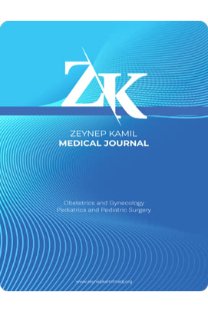Dört İskelet Displazisi Olgusu Skeletal
Dysplasia: Report of Four Cases
___
- 1. Shohat M, Rimoin DL. The Skeletal Dysplasias. In: Lifshitz. Pediatric Endocrionology. New York: Informa Healthecare; 2007. p.145-162.
- 2. Jones KL, Jones M. Thanatophoric Dysplasia. In J. M. Jones KL. Smiths Recognizable Patterns Of Human Malformation. Philadelphia: Saunders; 2013. p.448,638.
- 3. Sharony R, Browne C, Lachman RS, Rimoin DL. Prenatal diagnosis of the skeletal dysplasias. Am J Obstet Gynecol. 1993;169:668675.
- 4. Bowerman RA. Anomalies of the fetal skeleton:- Sonographic findings. AJR. 1995;164:973-9.
- 5. Barbosa-Neto, Oriolli C.The birth prevalence rate for skeletal dysplasias. J Med Genet. 1986;23:328- 32.
- 6. Sillence DO, Senn A, Danks DM. Genetic hete- rogeneity in osteogenesis imperfecta. J Med Genet. 1979;16:101-116.
- 7. Fink IJ, Filly RA, Callen PW, Fiske CC. Sonog- raphic diagnosis of thanatophoric dwarfism in ute- ro. J Ultrasound Med. 1982;1:337-339.
- 8. Krakow D, Lachman RS, Rimoin DL. Guidelines for the prenatal diagnosis of fetal skeletal dysplasi- as. Genet Med. 2009 ;11(2):127-33.
- 9. Maroteaux P, Lamy M, Robert JM. Thanatopho- ric dwarfism. Presse Med. 1967;75:2519.
- 10. Tavormina PL, Shiang R, Thompson LM, Zhu YZ, Wilkin DJ, Lachman RS, et al. Thanatophoric dysplasia (types I and II) caused by distinct mutations in fibroblast growth factor receptor 3. Nat Genet. 1995;9(3):321-8.
- 11. Langer LO, Yang SS, Hall JG, Sommer A. Kottamasu SR, Globi M et al. Thanatophoric dyspla- sia and cloverleaf skull. Am J Med Genet. Suppl 1987;3:167-179.
- 12. Corsello G, Maressi E, Rossi C, Giuffre L, Cittadini E. Thanatophoric dysplasia in monozygotic twins discordant for cloverleaf skull: prenatal diagnosis, clinical and pathological findings. Am J Med Genet. 1992;42:122-126.
- 13. Byers PH, Tsipouras P, Bonadio JF, Starman BJ, Schwartz RC. Perinatal lethal osteogenesis imperfecta (OI type II): a biochemically heteroge- neous disorder usually due to new mutations in the genes for type I collagen. Am J Hum Genet. 1988 ;42(2):237-48.
- 14. Wenstrup RJ, Willing MC, Starman BJ, Byers PH. Distinct biochemical phenotypes predict clinical severity in nonlethal variants of osteogenesis imperfecta. Am J Hum Genet.1990;46(5):975-82.
- 15. Barnes AM, Chang W, Morello R, Cabral W, Weis M et al. Deficiency of cartilage associated protein in recessive lethal osteogenesis imperfecta. New Engl J Med. 2006;355:2757-2764.
- 16. Escribano-Rey RJ, Duart-Clemente J, Martí- nez de la Llana O, Beguiristáin-Gúrpide JL. Os- teogenesis imperfecta: Treatment and results of a case series. Rev Esp Cir Ortop Traumatol. 2014;58 (2):114-9.
- 17. Bodian DL, Chan TF, Poon A, Schwarze U, Yang K, Byers PH. et al. Mutation and polymorphism spectrum in ostoegenesis imperfecta type II: implications for genotype-phenotype relationships. Hum Molec Genet. 2009;18:463-471.
- 18. Byers PH. Osteogenesis imperfecta.In: Royce, P. M.; Steinmann, B. : Connective Tissue and Its Heritable Disorders: Molecular, Genetic, and Medical Aspects. New York: Wiley-Liss ;1993. p. 317-350.
- 19. Samson GR. Skeletal dysplasias with osteopenia in the newborn: the value of alkaline phosphatase. J Matern Fetal Neonatal Med. 2005 Mar;17(3):229-31
- 20. Grigelioniene G, Geiberger S, Papadogiannakis N, Mäkitie O, Nishimura G, Nordgren A et al. The phenotype range of achondrogenesis 1A. Am J Med Genet A. 2013;161(10):2554-8.
- ISSN: 1300-7971
- Yayın Aralığı: 4
- Başlangıç: 1969
- Yayıncı: Ali Cangül
Jejunoileal Obstruksiyonlarda Mortalite ve Morbiditeyi Etkileyen Faktörler
Vedat AKÇAER, Ayşenur Cerrah CELAYİR, İnanç CİCİ, Serdar MORALIOĞLU
Alagille sendromu’na eşlik eden kronik böbrek yetmezliği: olgu sunumu
Selahattin AKAR, Sevilay TOPÇUOĞLU, Dilek YAVUZCAN ÖZTÜRK, Güner KARATEKİN, Fahri OVALI
Prematüre retinopatisinde intravitreal anti-VEGF tedavisi
Alagille Sendromu'na Eşlik Eden Kronik Böbrek Yetmezliği: Olgu Sunumu
Selahattin AKAR, SEVİLAY TOPCUOĞLU, Dilek ÖZTÜRK YAVUZCAN, Güner KARATEKİN, Fahri OVALI
Dört iskelet displazisi olgusu.
Bilge DEMİREL, Didem ARMAN, Hatip AYDIN, Sevilay TOPÇUOĞLU, Tuğba GÜRSOY, Güner KARATEKİN, Fahri OVALI
Ayşe Nur AKSOY, İlay GÖZÜKARA, Suna Kabil KUCUR, Gonca BATMAZ, Esra LALOGLU, ELİF BULUT
Gebelikte Adneksiyel Kitleye Yaklaşım: Olgu Sunumu ve Derleme
Elif MEŞECİ, Semra ESER KAYATAŞ, Cem ÖNCÜLOĞLU, Fuat DEMİRKIRAN
Pulmoner kapak yokluğu sendromu: olgu serisi
OYA DEMİRCİ, Taner YAVUZ, Emre ERDOĞDU, Resul ARISOY, PINAR KUMRU, Oya PEKİN, Bülent TANDOĞAN
